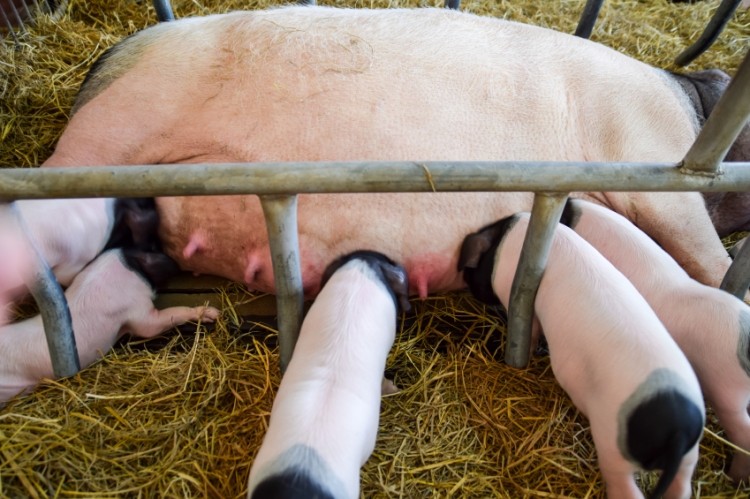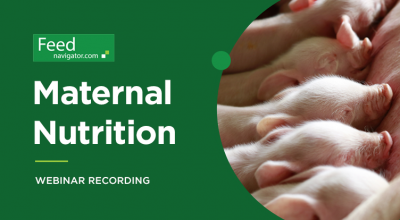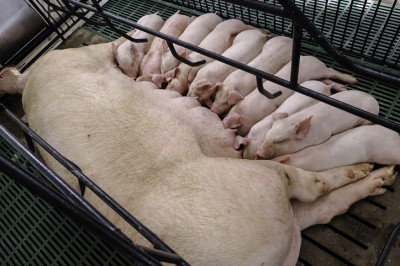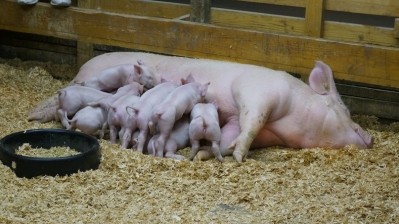Special Edition: R&D trends in vitamins, minerals, amino acids and yeast cultures
Sow health, nutritional status of neonatal pigs and colostrum quality on R&D agenda at DSM

We caught up with Dr Jon Bergstrom, senior technical support manager, swine, with DSM Nutritional Products North America, to hear about his team’s current focus.
In fact, DSM is currently renewing its Optimum Vitamin Nutrition (OVN) guidelines for farmed and companion animals. Last published in 2011, the guidelines are due to be re-issued in 2016. “There will likely be a few, seemingly modest, but important, improvements in the optimum vitamin recommendations for supplementation,” he said.
However, as the interest and research in the importance of vitamins for nutrition and health are continuous, he said DSM routinely publishes improved, scientifically-based guidelines every five to six years.
“Vitamin research is extremely challenging, and, as such, there are a limited number of nutritionists involved in this field,” he said. “And progress is relatively slow - not much evolves over a five to six year period in terms of vitamin R&D as compared to a field such as amino acids.”
Studies to determine macronutrient requirements for growth are generally not as complex as those required to improve our understanding of the micronutrient requirements for optimal growth, reproduction, and health and immunity, said Bergstrom.
“For instance, micronutrient nutrition can have long-term effects, such that supplementation levels which appear adequate for performance within good conditions may consequently be inadequate if an animal happens to experience a significant exposure to a disease or other physiological stressor.
Similarly, the importance of maternal nutrition for the development and potential of the progeny is becoming more widely recognized. Nevertheless, with the continuous genetic developments in farm animals, it is important to regularly reassess and improve our understanding of the optimal requirements for all classes of nutrients,” he added.
Swine vitamin focus
Currently, the areas of particular interest he and his colleagues are evaluating include the conditional requirements for vitamin C, the role of vitamins in reproductive health, how to improve the quality of colostrum and the nutrition status of low birth weight pigs and the potential benefits of supplementing swine diets with beta-carotene.
The division wants to acquire a greater understanding of the importance of the transfer of micronutrients from the sow to the progeny, and identify where there may be opportunities to improve the nutritional status of neonatal pigs, whether in utero or through colostrum.
“Industry is primarily concerned with the increase in litter size and the associated decrease in average birth weight of the progeny. Piglets with low birth weight are more challenging to keep alive and for farmers to make a profit on because of insufficient growth or weakened immune status.
So we are looking at supplementation of vitamins A, D, E, and C, as well as beta-carotene, in the diets of sows to see how they can boost the nutritional quality of the colostrum and aid the absorption of immunoglobulins in piglets,” said Bergstrom. “Some of these may be particularly important during times when there is temperature (heat) or other forms of stress.”
Colostral immunoglobulin transfer is said to be essential to the pig’s immunity and survival, as the newborn pig is devoid of circulating antibodies and must attain maternal immunoglobulins via colostrum during the first few hours postpartum.
“This is a fairly new avenue of swine research though - there is not a lot of work going on elsewhere looking at quality of colostrum and how that might be improved,” continued the DSM swine specialist.
Sow reproductive health
The recent emphasis on obtaining and capitalizing on the greater reproductive health and performance of sows has stimulated new research initiatives by DSM.
“Sow longevity has become more important as we can see an increase in number of piglets per sow during their lifetimes. Taking our lead from the dairy cattle side, we are exploring the benefits of beta-carotene supplementation for sows. The evidence is clear it can help in dairy cows’ reproductive health, colostrum and milk quality, and the health of calve; and we believe it can improve colostrum and milk quality in sows.
We are attempting to do research in this area with swine in the US, but we know there is interest in this concept globally,” said Bergstrom.
Conditional requirements for vitamin C
Pigs are generally recognized as being able to produce their own vitamin C, said Bergstrom.
However during weaning, due to high stress levels, this function in piglets often appears to be inadequate, he said.
“So we have explored whether supplementary vitamin C at this stage can improve their nutritional status and performance - in several studies it has been demonstrated that, when piglets received vitamin C supplementation immediately after weaning, their growth, feed intake and feed efficiency were improved.
We are continuing to investigate the benefits of such a supplementation strategy and explore the interplay of other important vitamins, as well as genetics, in this context,” said Bergstrom.
Vitamin stability
The DSM swine nutrition expert said the quality of the vitamins, supplied in swine feeds is critical, particularly in relation to vitamin C, and can’t be overstated.
“This is something we strive to continually educate producers and industry about – stability should come ahead of cost when selecting vitamins as it’s about ensuring the vitamins are in a protected form to survive the processes used in feed manufacture so that they are available to the animals eating the feed,” he said.
Bergstrom noted some studies have not reported a benefit to supplementation with vitamin C post-weaning. “But in some of those studies they may not have used a stabilized form of the vitamin in diets that were pelleted. Vitamin C is one of the less stable vitamins, so a stable (phosphorylated) product form is important for achieving the desired benefits of supplementation,” he added.
The final vitamin product forms should also have good handling characteristics, so that their relatively small quantities are thoroughly distributed throughout the complete feed, he said.














